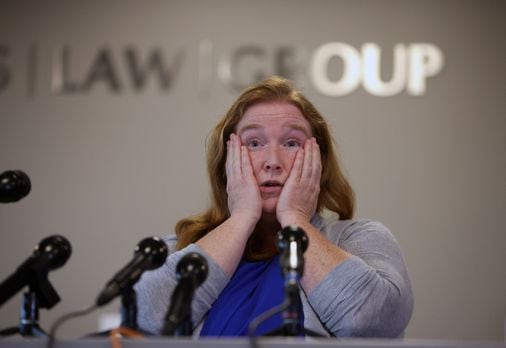Infection
Lawsuit filed against Salem Hospital over possible exposure to HIV and hepatitis
The letter from Salem Hospital looked very ordinary from the outside, Melinda Cashman recalls. But when she opened it, she said, anxiety gripped her.
“We are reaching out to you because our records show that you had an endoscopy at Salem Hospital between June 14, 2021 and April 19, 2023,” the letter said. “We recently learned some patients may have been exposed to an infection on the day of the procedure. After our review, it appears you are one of the patients who may have been exposed.”
The letter did offer some solace: “Your risk of an infection is very low,” it said. “To date, there has been no evidence of any infections resulting from this possible exposure.”
Cashman received the letter late on a Friday, Nov. 3, and couldn’t get more information until Monday. She spent the weekend worrying about “anything and everything that could happen,” she said in an interview Friday. “What kind of infections could I have? How long did these take to show? How long do they stay in your system?”
Cashman is the first named plaintiff in a lawsuit filed Thursday by the Keches Law Group in Suffolk Superior Court. The suit accuses Salem Hospital; its parent, Mass General Brigham; and 10 unnamed employees of negligence and negligent infliction of emotional distress resulting from a lapse in infection control over a two-year period.
The state Department of Public Health, which conducted an on-site inspection, affirmed that no infections resulting from the error have been identified and that the risk of infection was “very low.”
But alarm bells went off for some of the 450 patients who received the letters. The hospital is offering them free tests for HIV and hepatitis B and C because symptoms of those illnesses don’t appear immediately.
So far 91 percent of the affected patients have completed, scheduled, or declined testing, and no one has been found to be infected, the hospital said Friday. In addition to the free testing, the hospital said it has offered “a clinician-staffed hotline to answer questions” and “any necessary support.”
When Cashman reached a hospital employee by phone the Monday after receiving the letter, the employee told her that a single-use instrument had been used multiple times on multiple patients, she said.
A Salem Hospital spokesman, however, would not confirm or deny this account. He also declined to detail what went wrong, how the problem was detected, and what steps the hospital took to prevent a recurrence.
Adam Bagni, the spokesman, said in an email that only one individual was involved with the improper procedure — a contract employee who no longer works there. The hospital has stated that a staffer failed to follow “best practice” when infusing medications during endoscopies.
The hospital, he said, first learned of the problem in April “and took immediate action to discontinue it and determine what risk, if any, there was to patients. Our initial investigation needed to examine a significant amount of patient data to determine the level of risk to every potentially impacted patient. The investigation ultimately determined the risk to patients was very low.”
But after consulting with the state Department of Public Health, the hospital in October moved to inform patients who may have been affected.
Asked what steps the hospital had taken to prevent another such error, Bagni said only: “We have undertaken multiple corrective actions in response to this event.”
Cashman, 45, of Amesbury, said that after the phone call, she walked into the hospital’s Danvers office and insisted on a blood test right away. The results, she said, arrived through the patient portal with no explanation. “I’m not a doctor. I don’t know what they mean,” she said.
Jonathan Sweet, one of Cashman’s lawyers, said that other patients who have contacted the law firm also feel confused. “They’re literally just receiving test results on their patient gateway, and that’s it,” he said.
Asked about these assertions, Bagni wrote: “Every potentially impacted patient who undergoes testing is informed of those test results through the patient portal. Once the results from all their tests are in, they then receive a phone call from the hospital. For patients who test negative, we leave them a voicemail informing them of the results and encouraging them to follow-up with us if they have additional questions.”
People who test negative do not need any follow-up tests, he added.
The suit, however, alleges Cashman will have to endure “a process which can take months or even years. As a result, Plaintiff suffered and will continue to suffer severe emotional distress and mental anguish associated therewith.”
In the interview, Cashman, an operations manager for a home-improvement company, said that she hasn’t been sleeping. “All I do is think about scenarios,” wondering what infections she might have caught from other patients, she said. “All I do is Google and research. I feel like I’m becoming obsessed.” She said she is the sole caregiver for her 79-year-old father with dementia and her mother, who is 84 and is worried as well.
Cashman and the other patients, the suit alleges, are suffering “permanent injuries, including additional testing and extreme anxiety and emotional distress and decreased quality of life.”
The complaint asserts that the hospital and its employees failed “to take necessary and appropriate measures” to protect patients from infection and that the hospital did not properly hire, train, and supervise its employees.
The suit asks the court to award damages and order the hospital to discontinue the “unlawful practices” that led to this incident.
Felice J. Freyer can be reached at [email protected]. Follow her @felicejfreyer.

